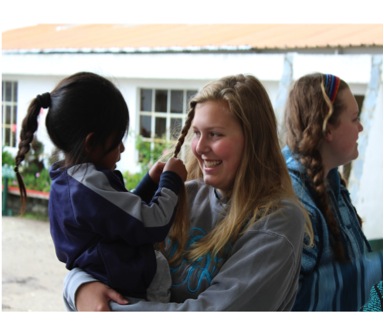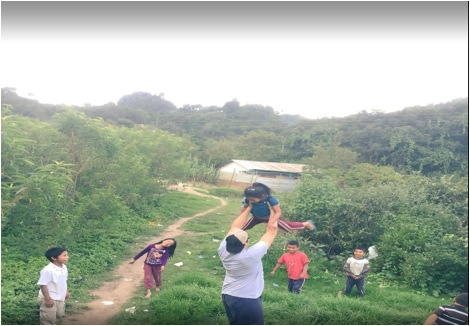Central In Central America: Students Spend Week In Guatemala Mission
September 19, 2016
Three students, Lauren Berry, Ollie Burrow, and Annie Knight began an exciting adventure when they boarded a plane from the quiet Clinton Airport and arrived in the hustle and bustle of Chichicastenango, Guatemala.
The purpose of this trip abroad was to do medical mission (work) for the isolated villages around Chichicastenango through their church, Pulaski Heights United Methodist Church. The students began their trip on July 30 and returned August 7.
“Many times, mission and service opportunities make us feel better about ourselves—which should never be the goal,” Rev. Jay Clark said. “To me, the goal should be to build relationships, listen to what a community needs, and together with that community— help make it a better place. ‘Better’ should be defined by the community you are helping serve, NOT what we feel would be best.”
The mission team had much more than just Tigers; dentists, doctors, nurses, and pharmacists accompanied them to Guatemala.
“We try to take young people who have a heart for service and mission— but also are trustworthy and respectful,” Clark said.

The team began their mornings bright and early with a cup, or two, of Guatemalan coffee. Then they would hit the road in their school bus—turned mission bus— to weave through windy mountain roads on the way to the villages surrounding Chichicastenango.
“The bus we had was an old school bus driven from the U.S. to Guatemala. Our bus driver, Nacho, had given it a sweet paint job and a new name, The Super Niña,” junior Lauren Berry said.
Once they arrived in the villages, the team set up their exam rooms and dental tables with sheets, close pins, and whatever they could find in old school buildings. The only supplies they had were what they could fit in a 50-pound suitcase; including drugs, stethoscopes and various dental tools.
“We had to improvise with whatever we could find in the village,” Dr. Drake Hawkins said. “One day we built our operating table out of concrete blocks and a sheet of plywood; some days we used school tables and stood on concrete blocks to work.”
The students were specifically part of the youth team within the whole mission trip team. Their jobs included assisting the dentist and cleaning his instruments, testing patients for glasses in the pharmacy, and handing out shoes as gifts to patients after they had medical work performed on them. The youth team also played games and entertained the children who were waiting to see the doctor.
“The children are so much fun—and excited to play with the older teens towering above them,” Clark said.
When they weren’t working, the youth team was shadowing doctors and nurses to explore career opportunities and gain experience.
“Shadowing doctors on this trip really inspired me to go into the medical field,” Lauren said. “I got to see extreme cases, like a 15-month old baby who weighed 13 pounds. I also got to see easy cases that we could treat with something as simple as Advil that we have easy access to in the U.S., but is not available in Guatemala.”
The procedures the team performed were very different from what they would see in the U.S. What they could do was not only limited by lack of supplies, but also the extreme degree of some medical cases. Dr. Vicki Flynn experienced one of these cases.
“I met a seven year old boy named Adison who could not speak or hear. He was smart and learning in school by reading along and making up his own form of sign language, but his only words were ‘Papa’ and ‘Mama.’ These weren’t words so much as breaths of air he pushed out and his lips mouthing out ‘Papa’ and ‘Mama.’ I used a few tools to perform an informal hearing exam,” Flynn said.
The result was something Adison could never had expected: “His eyes lit up and he had the brightest smile when the tuning fork (one of those tools) was placed in various spots on his head and in front of his ear. He could hear it! It wasn’t a definitive test, and it didn’t confirm that his hearing and speech problems would be resolved, but it did give him and his mother hope,” Flynn said.
While they were working, the whole team learned more about poverty than they could ever learn from a textbook or by watching the news.
“While I felt I was well-educated about world poverty, working with it first hand was a reality check,” Hawkins said. “I suppose the biggest epiphany for me was the cold realization that we were seeing hundreds of patients living in crushing poverty and this was a tiny fraction of one small Central American country.”
Though Guatemala is a third world country, the people do not let poverty consume their lives.
“Yet, for all that they lacked in possessions, they made up for in spirit. They were resilient, steadfast people who were grateful for what they did have and engaged in their communities,” Flynn said. “It opened my eyes to how blessed I am, how much I take for granted, and how I could be doing more for others.”
The dental team was often busy performing oral surgery. The procedures they could do were limited to pulling teeth because of their supplies and the severity of the tooth decay in Guatemala. Tooth decay is a huge issue in Guatemala because the tap water is unsafe to drink and the price of bottled water is too high for those in poverty, so they buy sodas.
“Often times it was difficult to determine where to start extracting a patients teeth and where to stop as they were all bombed out,” Hawkins said. At my practice here in Little Rock we rarely have to extract teeth and never see decay of this magnitude.”
The doctors were also diligently working to do what they could for the people of Guatemala and curing them with the limited medicines they had available, despite the advanced degrees of cases.
“One of the most shocking things was how advanced different disease processes got in Guatemala,” Flynn said. “Third world countries don’t have easy access to medical/dental care – not even vitamins or ibuprofen—and disease presentations didn’t always look like they do here. “
Another obstacle the mission team had to overcome was the language barrier. Although the national language of Guatemala is Spanish, the people of the villages speak mainly the Mayan dialect K’iche’ and a little Spanish. Eight translators accompanied the team to the villages. One translator would translate from K’iche’ to Spanish and another from Spanish to English.
“I took four years of Spanish; once you accept that your Spanish isn’t perfect you become fluent enough to talk to the people,” junior Ollie Burrow said. “ Luckily for me, I interacted with children whose Spanish wasn’t much better than mine.”

The trip taught the students, gave them experience, but most of all impacted them forever.
“Sure the work we did was important for the people of Guatemala, and they benefited from us, but I believe that I got way more from them than they did us,” Ollie said. “I learned that you don’t need anything other than yourself to be happy. But having a futbol and some bubbles helps.”


